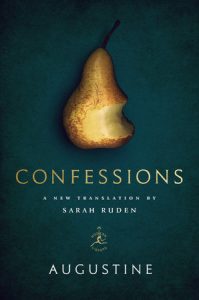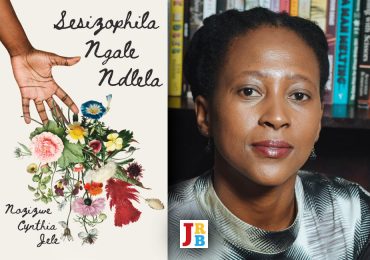
Sarah Ruden responds to David van Schoor’s review of her translation of Augustine’s Confessions, ‘Translation as nuclear arms race’, published in the November edition of The JRB.
Confessions
Sarah Ruden
Modern Library, 2017
To the Editor:
As I read David van Schoor’s review of my new translation of Augustine’s Confessions, a passage in Virginia Woolf’s A Room of One’s Own kept coming to mind:
I thought of that old gentleman, who is dead now, but was a bishop, I think, who declared that it was impossible for any woman, past, present, or to come, to have the genius of Shakespeare. He wrote to the papers about it. He also told a lady who applied to him for information that cats do not as a matter of fact go to heaven, though they have, he added, souls of a sort. How much thinking those old gentlemen used to save one! How the borders of ignorance shrank back at their approach! Cats do not go to heaven. Women cannot write the plays of Shakespeare.
Van Schoor belongs to a secular institution, Rhodes University, but I am going to visit on him the same basic complaint that Woolf visited on the bishop: he may think he is defending the glories of civilisation, but he is really only struggling to keep them wedged in his cramped intellectual niche.
If I tried, I could not have set out better evidence than his stifling review does for the need to render the sacred literature of the late-antique West in widely accessible living languages—in which, in fact, the texts were composed in the first place, by authors wishing to reach as large an audience as possible. Augustine himself, as a bishop and hero of the most centrist, accountable, and open version of the early Christian church—it was called catholicus in Latin at this point only because that word came from a Greek one meaning ‘general’ or ‘universal’—strove, above all, to be heard. His main mission was to bring ordinary people in, and to guide them in terms they could understand and concur with, however different his own elite experience and interests were from theirs.
He addressed them in the language both of the streets and of popular oratorical performance in North Africa: Latin (not Greek, which he himself could read, and which was the original language of the New Testament). With vivid imagery and catchy wordplay, he assured them of God’s love and told them how ashamed they should be for raping their slave women. (Peter Brown, in a recent encouraging account of my translation in the New York Review of Books, cites recently-recovered documents showing that Augustine was a fervent opponent of enslavement by kidnapping, a rampant abuse of his time.)
I’m grateful that negative reviews like Van Schoor’s have been few, but I’m shocked at their mean-spiritedness. The Confessions is a much more intricate work, in its style, than Augustine’s sermons, and so was a great challenge to me as a mere reader of ancient languages rather than a specialist literary scholar. As to theological and metaphysical matters, they are set out in excellent modern line-by-line commentaries like that of James O’Donnell, which I consulted. But I’m a Quaker, a member of a practical, literally and figuratively bridge-building sect, so I’m not used to religious abstraction. In two important senses, then, to translate Augustine, I had to learn by the seat of my pants, and to any really knowledgeable reader, that must show in my translation.
But what Van Schoor appears to be impugning me for is not the failure to convey form or meaning, but rather my stubbornness in neither quailing before modern ecclesiastical dicta nor flailing or fainting amid an existential fog of interpretive helplessness—the response he clearly prefers.
He decries the sort of thing I can do, which is to offer in English a workable version (aiming at the original logic and tone) of, for example, a Biblical-Aristotelian pun, a short explanation of the pun in a footnote, and, in the introduction, a broad explanation of how threads of influence interweave wittily in the Confessions. I maintain that such is the main task—fascinating but demanding—that Augustine left to his translators, a task that previous translators have shirked. What would readers want or need from a translation of a classic more than to understand and enjoy it? Van Schoor doesn’t tell me. He does tell me that the whole bridging project is contemptible; he writes that he dislikes the very word ‘accessible’, as if he wants translations to be inaccessible.
Van Schoor is against efforts to benefit the general reader. He actually fleers at that term—‘there is no such thing’—leaving me to wonder how he could usefully approach his own lectures and tutorials. Do all his students arrive as academic specialists or Proustian aesthetes? Or do none even aspire to read older and foreign literature, though they are equipped at first only with their much more general knowledge of the cultures that surround them now?
In any case, Van Schoor sets out to show the wrongheadedness of attempts to understand the Confessions; but his only basis for this is the work’s purported burden of ‘doubt’, ‘hesitation’, and other suspiciously modern-sounding qualities. This is all pretty ridiculous. No work of literature outside scripture and liturgy is more ideologically and thematically committed and purposeful; no work at all was probably more swiftly composed (perhaps, some scholars think, dictated to a relay of scribes in the author’s bedroom during a confining but not debilitating illness). The prose is digressive, but only because the author gave quite free, exploratory, and entertaining play to his mind in his long love letter to God. But it is my perception and reproduction of fun that Van Schoor seems most to abhor in my version. He doesn’t bother to try refuting that there are verbal hijinks to be found in nearly every passage; he seems against fun on principle.
Such refusal to engage with the actual author or the actual text is too common, and is in fact the main reason I undertook this translation. It therefore isn’t a surprise—though it is annoying—that some reviewers come at me with shibboleths, fabrication, sentimentality, and what amounts to scolding about my concern with history, biography, linguistics, and aesthetics, and my attempts to make all of these useful to the general public for enjoying a world literary heritage that is, after all, theirs by natural right and the clearly-intended gift of the hardworking and talented authors.
Van Schoor actually intones, ‘It is almost as if with Ruden there is, in the name of historical authenticity, which feels spurious to this reviewer, a need to remove the sediments of Church and Catholic history that have accumulated over the centuries …’ Hence, I guess, if Augustine writes the contemptuous word mulierculae (‘trivial womenfolk’ or ‘little women’—probably better: ‘womansies’), and other translators (some, but hardly all, attached to Catholic institutions) have smoothed the word over to buff the plaster saint or for some other questionable motive, while I write what the lexicographical evidence dictates, then I’m the dishonest one?
Interestingly, though this is my eighth book-length translation, it was only extremely rarely before now that I ran into this style of criticism, rife with ignorant assertion and laced with unprovoked derogatory remarks. This might have to do with, this time, my retranslating boldly a work by a powerhouse of enduring Western ideology; and maybe the reaction is worse because traditional Western culture is on some sort of edge—or at least is more than usually edgy about listening to hitherto excluded people, such as women translators of sacred literature who are not affiliated with a major church.
In any case, Van Schoor’s cardinal snark at me should outrage all intellectual decency: it is, he writes, the ‘hermeneutic impudence that constitutes the failing of Ruden’s translation—but also provides its intermittent appeal’. In other words, I have the gall (redeemed only by occasional gamine raffishness?) to read and interpret for myself and to offer others the results in their own modern language, as Martin Luther, whom Van Schoor names as the original cultural sinner, did in establishing access to the Bible through translation into German. The deplorable consequence, to which I am supposed to be party, is individualism and liberty of thought.
This is a particularly idiotic charge to bring against a translator of Augustine, who was (in his own way) at least as self-exploring, self-determining, and monumental an individual as Luther. Both became passionately religious, and both verged toward full moral and institutional conformity, but in both the process took a long time, was full of pain, and was probably completed only because they themselves did so much to shape morals and institutions for a new era they envisioned. Both wrote with the energy of fiends, and with shattering originality and wit; both were concerned to make scripture in Greek more serviceable to believers who knew only the demotic. (‘Demotic’ is another of the review’s bogey-words.)
If they thought, as Van Schoor evidently does, that it’s best to suppress one’s own knowledge and reasoning concerning ‘the sensational [sic] and the immaterial stuff of language’, they certainly didn’t act like it. If they secretly feared that pushing toward more vivid inspiration through words, or simply toward more clarity, entailed an arrogant confidence that they could know ‘absolutely’ (Van Schoor’s accusatory word), in an unmediated way, what language signifies, in competition with God’s perfect knowledge, such a fear would, at any rate, have been soundly and constantly contradicted by their own expressed beliefs, their writings, and their other religious practices. It was inherent in their faith, their realistic but hopeful view of themselves as mere human beings, that they did their cheerful best. So do I, as an expression of my faith.
That faith, a commitment to God as a reality, demands in tandem an allegiance to lesser realities I experience—such as an author’s authentic style. Augustine didn’t speak an ecclesiastical, circumscribed language (to the extent that there was one at the time) even when, after his conversion but still with resistance, he was ordained and came under the church’s auspices; nor during the decades when he worked nonstop to defend the church’s solidifying doctrines and rituals. He was not an intellectual creation of the church but a professional orator trained in the pagan classics and led by pagan philosophy in his crucial steps toward conversion; he celebrated that event by setting up a leisured coterie for abstract discussions, as his partial exemplar Cicero had done four hundred years before. His main offerings to Christianity thus came from outside the religion, though his own main emotional sustenance came from within it. As the Confessions shows, his treatment of the Bible itself (which he reports having looked into for the first time—and spurned—in his late teens) could be extremely imaginative and speculative, like a typical Roman author’s heady transformation of a Greek or earlier Roman work according to his own ambitious vision.
One reason that grasping and reproducing the manner of his writing is so important to conveying who and what he was, and all the riches of thought that he left us, is that the uncanny joy of salvation—his great motivation and purpose—is inherent in his literary performances. He was a slave, he writes, but God set him free, and in his case that particularly meant being able to explore ideas and to use his snazzy verbal talent at the same time, as any high-flying man of letters did in the wake of the Second Sophistic rhetorical movement—but now the frivolous language was redeemed; it was to be anything but frivolous, because it was to serve God. It’s a markedly artistic version of the ever-repeated story of ‘grace abounding to the chief of sinners’. Hence, it isn’t right to translate him—as he’s usually been translated—as if his prose were flat as a board, but instead to aim at what it actually sounds like, with (for example) as many rhymes and alliterations as will fit into acceptable English usage.
In short, he is the last author on Earth whom a conscientious translator would render by cribbing from other translators, who themselves tend to coast on the shallowest, most anachronistic notions flowing from eras that depicted, in the visual arts, even Biblical characters in local and contemporary clothes, interiors and landscapes. ‘Confessio, well, means just confessing sins, the way we do in this monastery’—that’s how the Confessions has typically been interpreted. I don’t change the translation of this word (for example) in order to be difficult or cute. I’m endeavouring to keep a great writer from sounding like a fool, as he would have done in using a word denoting only ‘confess’ for praising God or engaging in reverent speculation about the nature of being.
That he didn’t use the word in this rigid, nonsensical way is a salient reality, which Van Schoor admits to, but without allowing for the obvious follow-through. Instead, he commends the translator Carolyn Hammond for ‘her handling of the defeat she suffers to the intractability of problems of translations, a kind of intelligent surrender to semantic aporia, [in which] one learns of a kind of satisfaction in dissatisfaction’. Hammond has retained ‘confession’ as (she writes) a ‘vital connective thread running through the text [his emphasis]’.
But what is this justification for doing what everyone else has done—one in a rather plentiful array of such pleas by Augustine translators—really worth? Endless repetition of one English translation of a Latin word isn’t, as a rule, a whiz-bang method for representing a language with a tiny vocabulary; literary Latin’s relatively few words tend each to have many possible meanings, depending on context. English, which (who knew?) operates differently, can nonetheless offer its different operations in the cause of moving nearer to the original text’s meanings and even forms.
But a variety of desiderata should and can balance out in the process. In this present case, if you do need a connective thread for thematic sense, then pick an English word that will cover nearly every meaning of confessio. How about ‘testimony,’ which I selected and used almost everywhere for confessio? Van Schoor makes out that I had no regard for continuity in the rendering of this important word, that I threw in variants at random because I was bored or rebellious. In contrast, he admires what might be characterised as Hammond’s stereotypical female passivity and deference (‘handling of the defeat she suffers,’ ‘intelligent surrender,’ ‘satisfaction in dissatisfaction’) and seizes with excited italics on her half-assed excuse for maintaining the traditional but poor English word choice throughout.
It is only in light of familiar gender politics that I can make sense of this rhetoric. This is the same male paranoia that bleats warnings of annihilation or castration—because a woman is daring to compete or achieve. I kid you not: Van Schoor is terrorised by my literary translation, with its impressiveness that he admits to: ‘Like escalation in the nuclear arms race, the proliferation of new, more powerful poetic ordinance may lead simply to all-round neutralisation.’ He can commend a woman translator, but only if she directs her efforts toward bowing to centuries of male mediocrity.
But I digress. Where I do vary a single word’s translation, as in using both ‘praise’ and ‘extol’ for the verb laudare in the opening passage of the Confessions, Van Schoor fails to acknowledge the lower tolerance that English speakers have for repetition. Laudare occurs six times in this short passage (and there’s also the adjective laudabilis, ‘praiseworthy’); and so a literal rendering sounds playground-y and sing-song, like children’s mockery—it’s too much of the late-Latin rhetorical style for us to digest in English. A tasteless, out-of-control translation of a gorgeous and ingenious text, a translation not carefully adapted in the target language to a register suiting the author’s purpose, is straightforwardly inaccurate; it is a financial rip-off, a professional dereliction, and an insult to readers’ judgment, curiosity, and intelligence.
Van Schoor goes as far as to object to my changes in paragraphing for the sake of clarity in the flow of ideas, as if previous translators’ big blocks of prose (compacting the digressions like the poor roots of a neglected potted plant) were somehow authentic, not a mere choice at some point in the history of copying or translation, a choice lazily imitated again and again thereafter. The real layout of the first manuscript—the version that Augustine’s scribes took down—was the hectic layout of shorthand chasing an excited genius. The formal old published text had no punctuation or divisions between words. And it was in Latin. Why not keep it in Latin, and in that form, rather than impudently, crassly update it? That’s the thrust of the review.
Van Schoor is not the first of my reviewers to pronounce pompously against a word choice without bothering to check the dictionary. He states that the compound verb circumfero is ‘colourless’; it cannot mean, as I render it, ‘haul around’; the action can have no strenuousness in it. But—again—with Latin’s tiny vocabulary, it’s all about context: fero can refer to carrying, say, a writing tablet, but when as a slave you carry the baggage on a trip or lug full baskets or sacks on a farm, when you bear a heavy yoke (as even humans might if they were enslaved), the verb is also fero—or else porto, gero, or veho, which lexicographers list as fero’s synonyms.
As for circum, or ‘around,’ grisly scenes in the Roman novel The Golden Ass, with which Augustine was familiar (and which I translated for Yale University Press in 2013), probably reveal the salient image here: a slave, horse, or donkey yoked to a millstone and driven around in endless straining circles. This image is consonant with the imagery of heavy spiritual burdens and spiritual slavery in other passages of the Confessions.
But Van Schoor thinks that, since the direct object of circumfero, in the Confessions’s opening words, is mortalitas (‘deathliness’), this particularly must be a light thing, merely carried and not hauled. ‘[T]hat is a different kind of burden, one that is possible to be unaware of … It is an extraordinary, weightless, fatal burden …’ Really, has Van Schoor read the Confessions? How can he think that Augustine grew up and found his religious calling and pursued it without an oppressive awareness of the main difference between himself and God?
Van Schoor doesn’t like my ‘deathliness’ either: ‘unusual in English, if not downright odd’. He suspects that I only wanted something ‘different from all those other translations,’ as if I were wearing a kangaroo costume at a wedding. No, I chose ‘deathliness’ because it is the correct word. It is rare in English, as mortalitas is rare in Latin. ‘Death’ and ‘deathliness’ have the same vivid relationship to each other that mors (‘death’) has to mortalitas; two primary meanings of mortalitas listed in a standard Latin dictionary are in fact ‘a dying’ and ‘a death’. Mortalitas isn’t the modern ‘mortality’, a limitation you can carry around unnoticed like lint in your pocket. It’s a confronting horror, like a fresh corpse left on the street for the curious to stare at—as Augustine relates. This author was even more animated by the thought of death than was usual for his time, so I let him have a vivid English word to reflect mortalitas. As always, I did my best to let him speak for himself.
I’m (alas) not cherry-picking the most succulently bad instances of Van Schoor’s criticism. Nothing he scolds me for appears to have any empirical basis. It’s as if he’s inventing a new sort of reviewing, in which Dadaist unreality or free-associating animus prevails.
A bonus is fundamental mistakes that have nothing to do with my translation. Van Schoor states, for example, that Augustine went from his native North African to Rome and Milan to study Greek philosophy. But the author, clearly and in detail, states that he went to Italy to continue teaching literature and oratory, just in a different professional environment; and this is—factually, historically—what he did. He was never, anywhere, under professional philosophical tuition; the rudimentary treatment of Aristotle that was the most his formal schooling could boast of left him contemptuous of the teachers as well as his fellow students.
I’m sure I sound unusually stroppy for a forum like this. By convention, writers of all kinds receive in public silence their reviewers’ opinions, content with the exposure if with nothing else; a response, and especially a response at this length and sporting this orneriness, is rare. But I rely for justification on the importance of the author I represent. To an intellectual outrage, it’s okay to react strongly—as Martin Luther did to a cleric unversed in the Bible and opposed to its use in guiding the church, but nonetheless sent to argue away Luther’s Bible-based objections to outstanding abuses by the papacy. This man was, the reformer wrote, no more fit to dispute with him than an ass to play the harp. Van Schoor as a critic of Confessions translation is like an Amish judge on ‘Dancing with the Stars’: he’s hardly a font of appropriate discernment, because all he wants is for the proceedings to stop.






??
If I say I LOVE Sarah Ruden’s translation of Augustine’s Confessions it is an understatement. I read previous translations whilst working on a thesis, I then happened to hear hers by watching a youtube video on Augustine and my heart leaped inside me when I heard it. Ive been searching high and low for an ebook of her Confessions but sadly none is available yet and due to Covid-19 imports into SA is slow. I cannot wait for her translation to become available on ebook. It is magnificent.
Luther’s self-aggrandizing myth that he was the first German translator of the Bible will somehow never die.